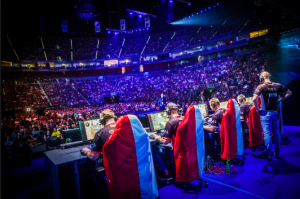The one-million-dollar question is – Can esports be considered a real sport and be at par with traditional sporting events? This debate has been going on for some time and has been further fueled by the announcement of the Olympic Committee that virtual sports will feature in the coming Olympic Games, something that makes all bookmakers and sports betting sites not on Gamstop raving about.
Traditional sporting activities comprise various elements like a competition between individuals, as in tennis, boxing, and skiing, or between teams, as in football, soccer, basketball, and baseball. It also involves skill and physical action aimed primarily at entertainment and winning competitions. That said, other forms of sports involve less physical exertion but still skills, experience and use of objects like pool, billiards, golf, and archery.
What is esports?
Selected sports like archery, driving and shooting have specific characteristics that align them closer to esports. All these activities require the player to use some sort of device to compete and contest, measure accuracy, and manipulate the device to create strength and speed. In the case of archery, the player requires a bow and arrow plus precision; in driving, the driver requires a steering wheel and pedal to create speed; whilst in shooting, the shooter requires a weapon and strict focus to accurately hit the target. One might argue that traditional sports consist of more or less some level of physical activity, which could be the crux or the bone of contention regarding whether to consider esports an actual and real sport.
The gaming community needs to understand that not all esports can qualify as actual sports. As it is crucial for real sports to have a competitive element and a winner at the end of the day, some esports games do not produce a winner. For example, for winners in Grand Theft Auto, the outcome is either death or arrest. In contrast, games like League of Legends, Rocket League, DOTA, and Overwatch require the player to have fine motor skills, hand and eye coordination, sharp reflexes and reactions, communication and team spirit, and dynamics. These kinds of games can be termed esports, more so since this game has drastically evolved to their current online form; the competition grew larger and larger beyond one’s living room environment and opened the possibility for millions to play via the internet. The advent of the internet and the rapid evolution of online gaming has rendered such games hyper-competitive and a vast global player base, all trying their best to win. In essence, games like League of Legends, Rocket League, DOTA and DOTA 2, and Overwatch are essentially esports, but all have the required elements of traditional sports.
What is the difference between sports and esports?
As in the case of traditional sports and players, a professional gamer requires skill and a lot of training to reach a certain level to compete in their area. As a footballer or a tennis player requires time and hard training to develop their skills and talents, so does a gamer who wishes to be seen as the Cristiano Ronaldo of online gaming. Involvement in esports requires dedication, concentration, precision and neat execution. The gamer leaves very little to chance and is aware that they cannot become a professional gamer without endless hours of in-gaming experience. Professional gamers understand the reality that there are millions of active gamers vying for the top titles in esports, and this is an important ingredient in pushing professional gamers to go beyond their limits and become the best in their field. Similarly, in tennis, having a swirling and speedy serve could be the turning point to win a match; the football striker who has the sense to be in the right spot at the right time to pop the ball past the goalkeeper or the jockey who knows the track and horse to head in front of his competitors.
Virtual is esports second name
The virtuality of esports can be an issue for esports to be considered a real sport. Since esports has been introduced recently, there is no benchmark to compare them. There is no history to refer to and draw conclusions from. It is the first time in history that virtual events are taking place, and many of us can feel proud and lucky to have been the generation that created this form of entertainment. Critics will argue that it is much easier to strike a ball in the virtual world than it is in a real-time football match or a tennis game. However, such critics can be educated by playing a minute-long game against a Supersonic Legend in Rocket League, which will make them think more profoundly before assuming that it is much easier in the virtual.
The virtual esports environment needs more mental prowess than the body’s physical activity. In this sense, esports is considered the levelest playing field that has existed so far. There are few other sports activities where all genders, regardless of height, weight, and even physical impediments, can play against each other and go head-to-head. Contrary to most traditional sports, the physical structure of gamers makes no difference when playing online. Unlike traditional sports like football, soccer, and basketball, females and males can play the same game. What really matters is the skill and talent of the player and their ability to strike first.
What do governing bodies say about esports?
Another important factor for understanding whether esports is a real sport is a distinction between what is considered a game or sport by official governing entities. Esports has already been recognized as a sport by the Asian Games, Universities and many countries like Pakistan. The final recognition from both the Olympics and Special Olympics is a strong signal and a significant step forward for esports to be seen as a real sport.
Great strides have been made to consider esports as a real sport. There is no doubt that the debate on this matter will continue in the coming months and years. There will be other global sporting bodies that will eventually realize and accept esports as a sport. What is truly actual and factual is that esports has now gained its rightful place in the global sports arena, with many new players seeking to get into the game.




